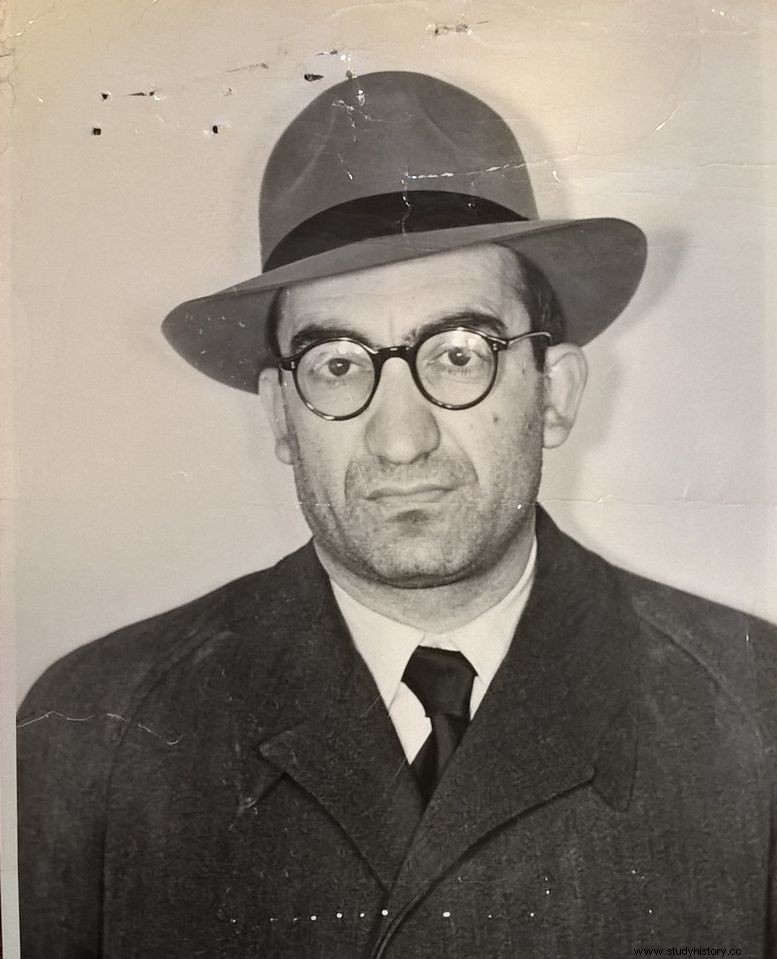From June 1950, when he returned to Greece to reorganize the then almost disbanded illegal apparatus of the KKE (one year after the end of the Civil War and the defeat of the Democratic Army), Nikos Belogiannis became the "favorite" of the prosecuting authorities, the which devote pages upon pages in their archives to the "very dangerous communist" and attempt to track his every move (as far as their expertise at the time allowed).
Belogiannis was of course not unknown to the authorities. On the contrary, his file was already "filled" from the period before October 28, 1940, during which the communist born in 1915 in Amaliada "wrote" a total of four convictions for communist activity. The start of the Greco-Italian war even found him, like hundreds of other communists, in the prisons of Akronaflia after the crushing blows that the Metaxas dictatorship and the infamous Minister of Public Order, Maniadakis, managed to inflict on the illegal apparatus of the KKE. In order to win his freedom and join ELAS, Belogiannis had to do one more daring act, to escape from the Sotiria hospital in 1943.
The Greece of 1950 was of course a different one compared to the pre-war Greece. The KKE had been defeated on the battlefields after the Civil War (1946-1949) and was looking for ways to keep the flame of the communists in Greece burning by reorganizing its local illegal networks. Nikos Belogiannis, together with the other emblematic figure of the communist movement of that time, Nikos Plombidis, was considered ideal for this job.
According to most scholars of the period, as well as the reports of KKE executives, Belogiannis was indeed very capable. An organizational spirit with a deep Marxist education, but also special sensibilities (lover of literature), the 35-year-old communist in 1950 had already dedicated his life to the idea of social emancipation. From June 1950 when he found himself in Athens (after the defeat of the Democratic Army he had fled to the socialist countries) he gave everything so that the KKE regained its old organizational vigor and addressed the masses through -necessarily-illegal activities of.
However, from the first months of his return to Greece, the prosecuting authorities were one step behind him and as time went by they increasingly tightened the cordon around Belogiannis and his environment.
Already, since October 16, 1950, four months after Belogiannis' return to his homeland, the Intelligence Service requests from the Gendarmerie Sub-Directorate of Amaliada any information about the wanted communist, since "he may still be acting in favor of the KKE or in the our region or elsewhere, or has taken refuge in the gangs or is in prison or in exile", as noted in the relevant document. It is characteristic that the Intelligence Service is asking to know information even about his possible death, a sign that his traces must be found at all costs, since "for a long time we have lacked information regarding his conduct, actions and current residence".
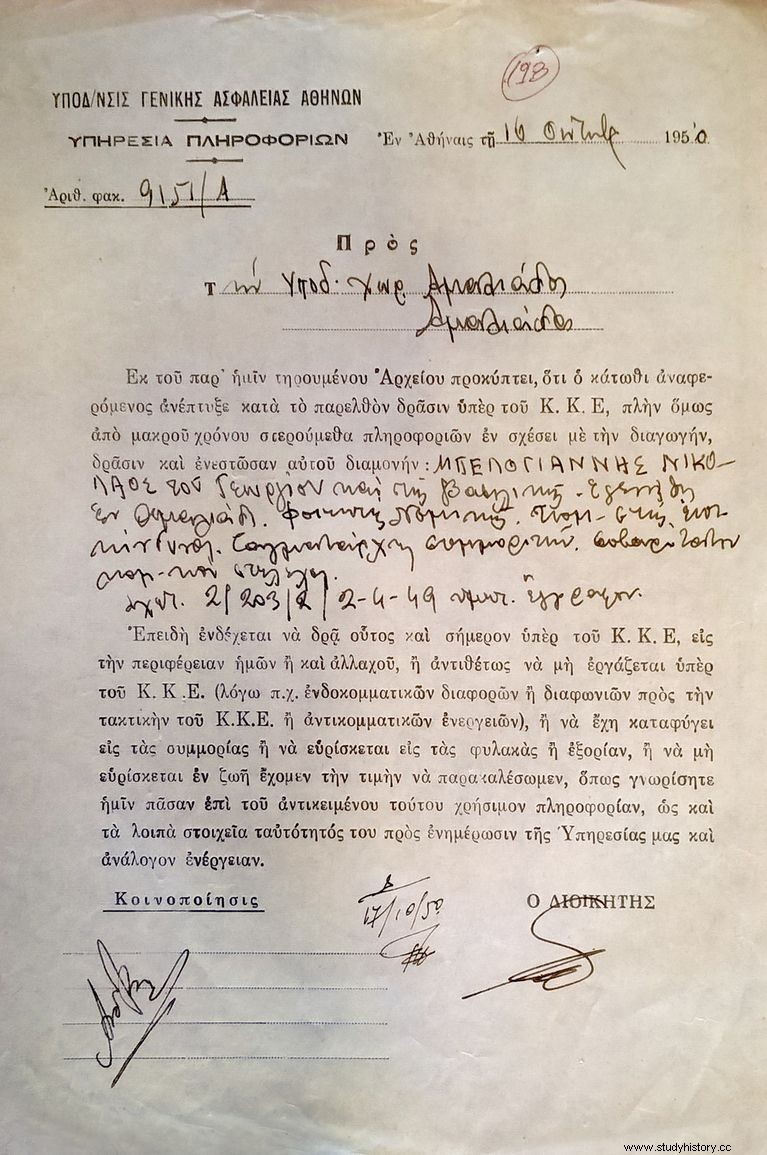
It goes without saying that Belogiannis was not walking around Athens with his normal identity at that time. He had made sure to procure a forgery with the information of Georgios Hocholis of Evangelos and Alexandra, "born in 1913 in Zelitsa Kalamon and residing at 47 Mavromichalis Street". It is also understood that the Authorities were well aware of all of his pre-war political activity. Belogiannis' Criminality Report with the number 219502 left no room for misinterpretation, as it listed all four of his pre-war convictions for communist activity (all during the Metaxas dictatorship, between 1936 and 1938).
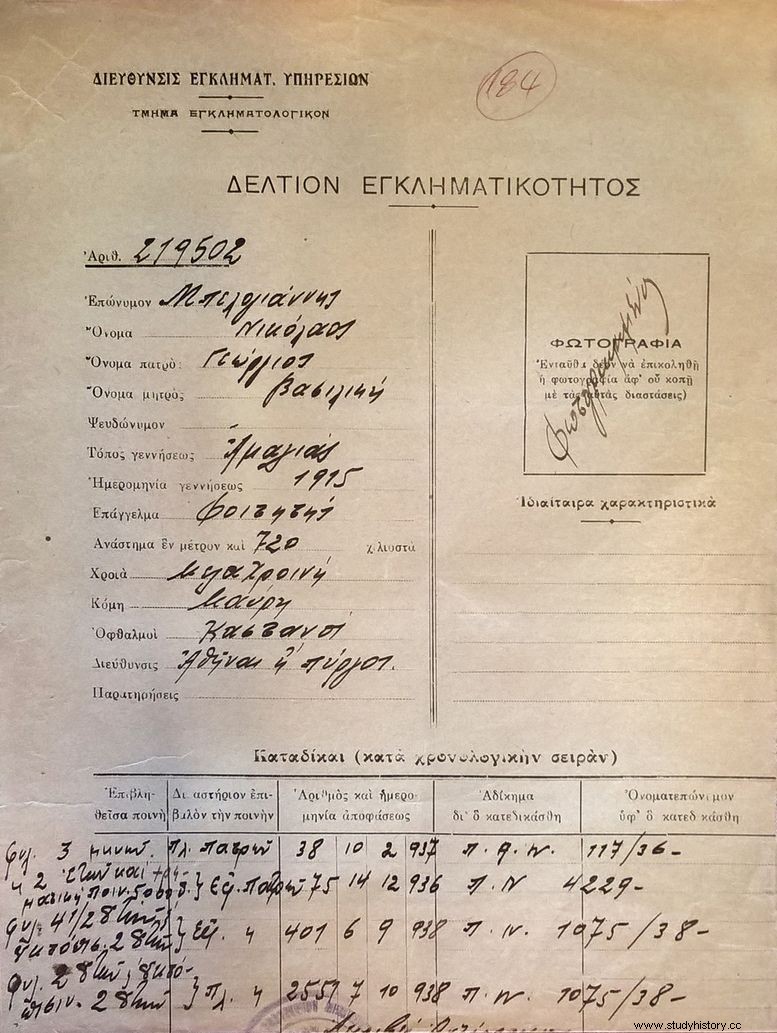
The Amaliada police department responds to the request of the Intelligence Service and provides all the information it has at its disposal regarding the actions of Nikos Belogiannis. The details of his activity prior to October 28, 1940 were known to the authorities, so the author of the note devoted only a few lines to that time period. There is more information about the way the wanted person acted during the Occupation (when he joined ELAS Peloponnese in 1943) and even more is the author's knowledge about the period from March 31, 1946 (date of the start of the Civil War ) and after. Details are given about Belogiannis' rise in the hierarchy of the Democratic Army, about his military action and his escape to Albania "you follow Zachariadis" after the final collapse of the front and the collapse of the Board of Directors. in Albania.
On December 20, 1950, the authorities managed to arrest Belogiannis, who initially gave false information. Georgios Hocholis of Evangelos and Alexandra. But through the parable of the fingerprints, his true identity emerges. This is Belogiannis Nikolaos tou Georgiou "marked and registered in our Office under acc. number 219502". It is, as we have seen before, the number of the Criminality Report, which is a way of having Belogiannis' "passport" for the environment of the prosecuting authorities.
The following document is sent by the Forensic Services Directorate of the Ministry of Public Order to the Sub-Directorate of Security. From December 20, 1950 onwards, Belogiannis spends his (last) days between prison and the courtroom.
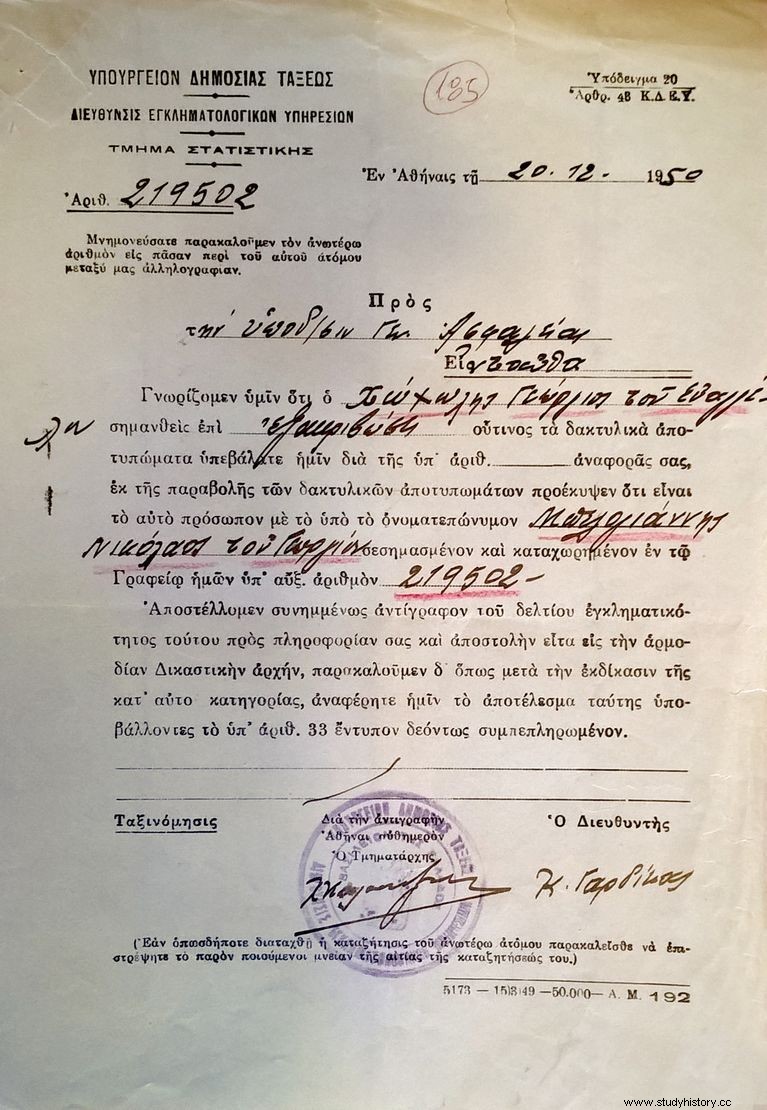
However, even after the execution of Belogiannis, on March 30, 1952 (along with Dimitris Batsi, Ilias Argyriadis and Nikos Kaloumenos), the persecutory mechanisms of the state are still dealing with the now dead communist, a sign that the overall value and his degree of "dangerousness" made him a particularly formidable opponent for the post-gender state.
In a bulletin of the Intelligence Service dated June 7, 1952 (a little more than two months after the execution) it is recorded that in a cinema in Haifa in Israel, following an initiative of the country's Communist Party, a film was shown about the trial of Belogiannis and of his companions.
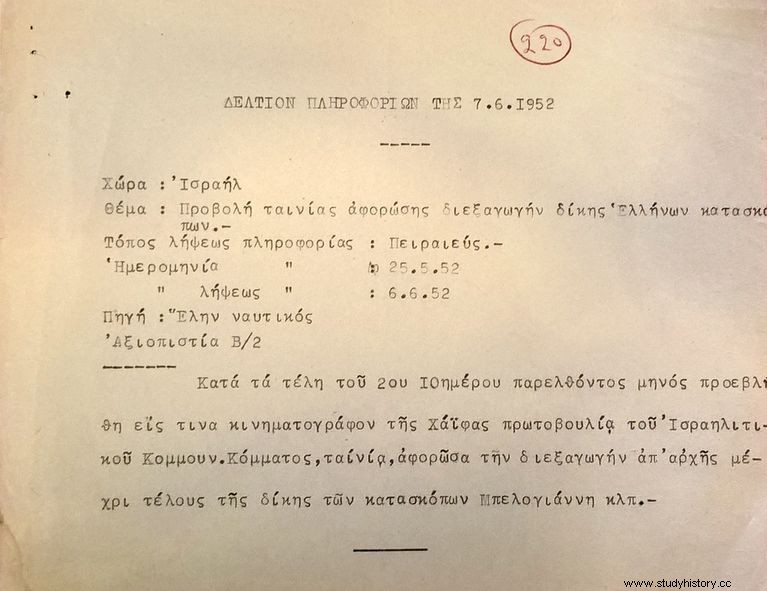
Additionally, on August 20, 1953, one year and five months after the execution, the Intelligence Service of the 1st Army Corps records that the Athens Police Directorate sent it "an attached copy of a report of Communist sympathizers trained in the Iron Curtain Espionage School". According to the document, Belogiannis attended a school in the Albanian city of Bureli (Burel in Albanian). Next to it, it is written:"Executed as a spy on 1/4/1952".
Still, however, and in their official estrus, the persecutors of Belogiannis did not imagine at that time that the name of the young man from Amaliada, who wanted to change the world, would be remembered even 70 years after his execution. Perhaps the sacrifice of Belogiannis and his three companions, as well as the sacrifice of Nikos Ploubidis, were not wasted after all. The movement of the following decades pressed on these sacrifices to shape its own actions and express its own agendas.
